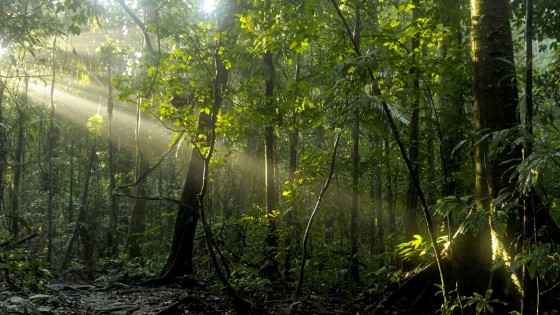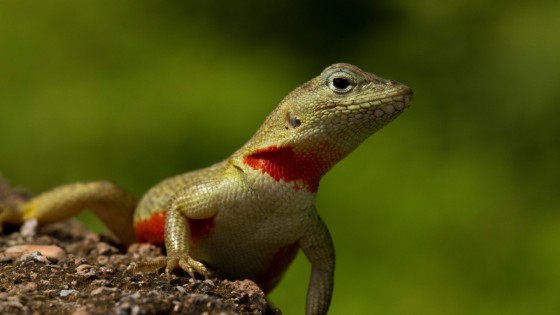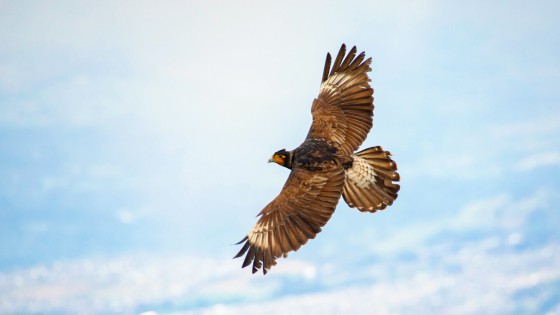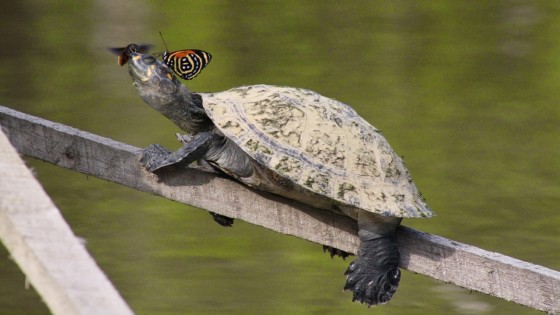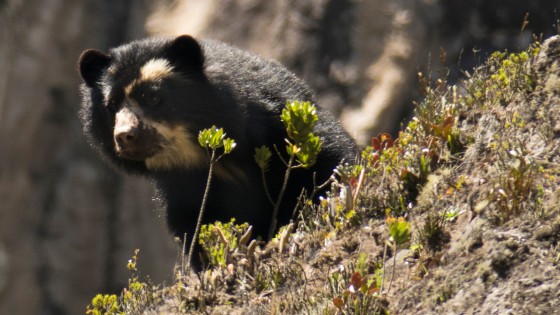Master's in Tropical Ecology & Conservation
4 semesters and 1 summer session
Subjects: 14
Total credits: 58
The number of daily hours may vary, depending on the timetable of each day. Field trips may include weekends.
RPC-SO-19-No.411-2020, August 26, 2020
$14.729
Fees: $1.339
Tuition: $13.390
Value with scholarship for Ecuadorians and residents*: $11,500.
* Students may apply for additional scholarships, depending on the student's economic and geographic background.
Applies for new cohorts: academic year 2023-2025.
USFQ admission exam:
15 February or 22 March or 12 April or 17 May 2025
This master's program aims to educate professionals who can enhance our understanding of the ecological processes that govern tropical populations, communities, and ecosystems in an evolutionary context. It also aims to prepare professionals who can design conservation strategies based on rigorous scientific research. The program is primarily focused on providing the necessary theoretical, practical, and methodological tools so that graduates can work effectively in interdisciplinary and multi-disciplinary research teams.
The program is conducted in English with the opportunity to take an elective class in Spanish.
Our students
Cohort 2023-2025
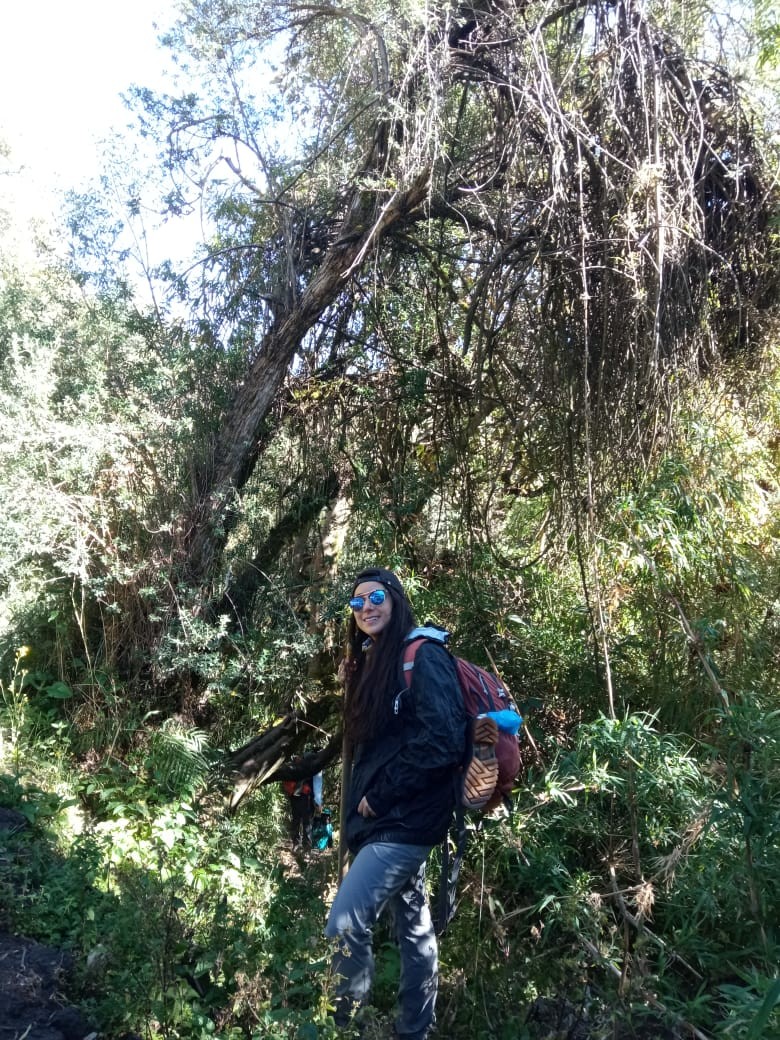
Verónica Baquero: researched Xylocopa darwini, the endemic Galápagos carpenter bee, recognized as a key super-pollinator in these islands. The main objectives of the study were to obtain an annotated reference genome and integrate RNA sequences from venom glands to identify genes associated with venom. These genes could provide valuable insights into the ecological adaptations and evolutionary history of this bee, since venom composition is linked to defense mechanisms and survival strategies. This project was carried out at the Plant Biotechnology Laboratory at USFQ, led by María Lourdes Torres (PhD), in collaboration with the University of South Carolina.
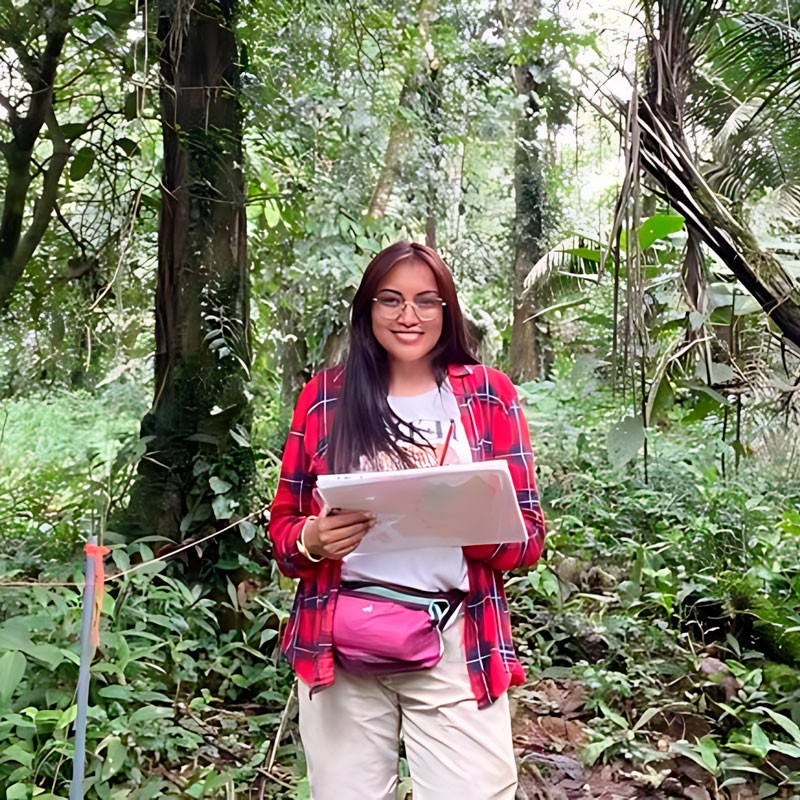
Mariela Bustillos-Lema: studied the structure of palm communities and the composition of their dispersers in Secoya territory (northern Ecuadorian Amazon). Understanding these dynamics is essential, as palms play multiple roles in forests and provide a wide diversity of ecosystem services. The information obtained is crucial for developing management and conservation strategies in priority areas, contributing to the protection of species, especially those highly valued by local communities for their utility. This work was part of the DISES project: “Resilient Socio-Environmental Systems: Indigenous Territories in the Face of Change”, led by Dr. Gonzalo Rivas-Torres and funded by the U.S. National Science Foundation.

Garrison Ferone: studied the genetics of the Galápagos bacalao, one of the most important fish in Ecuadorian gastronomic culture, especially for its role in the traditional dish fanesca. His results are being used to propose management and conservation measures for this species based on scientific data. This study was led by Drs. Diana Pazmiño and Alex Hearn, USFQ professors and researchers at the Galapagos Science Center.
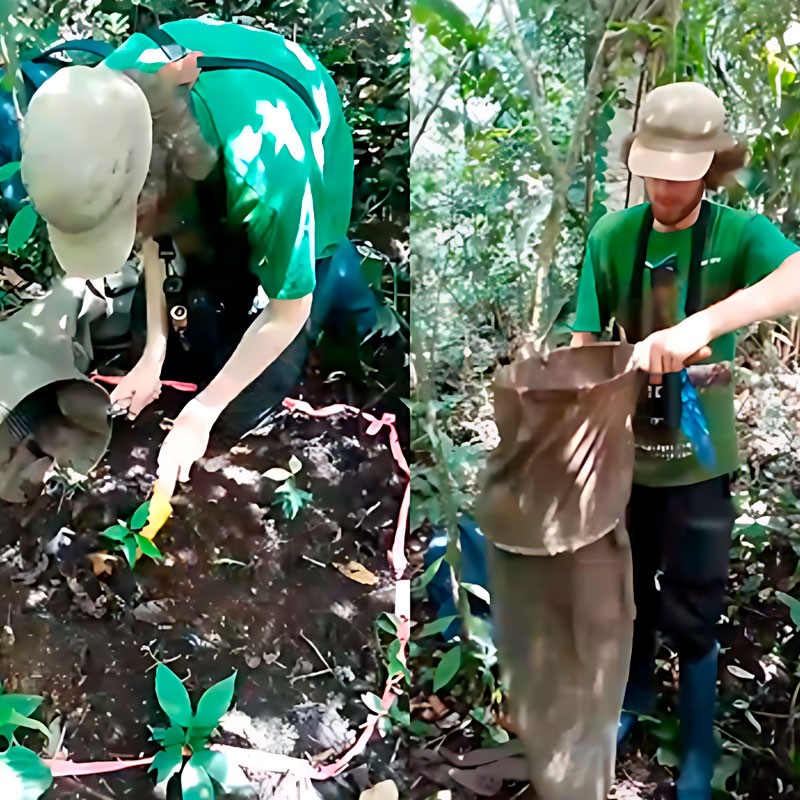
Juan Francisco Herrera Cueva: evaluated the effect of oil platforms with active flares on the diversity of insectivorous birds and their primary food sources. To do this, he conducted passive measurements of bird and insect diversity and abundance in plots close to and far from the impact site, within the Yasuní Biosphere Reserve. This work seeks to quantify part of the ecological impact of flaring in the Ecuadorian Amazon and promote the development of public policies in favor of biodiversity protection. His thesis was supervised by Dr. Gonzalo Rivas-Torres (USFQ) and Bette Loiselle (University of Florida).
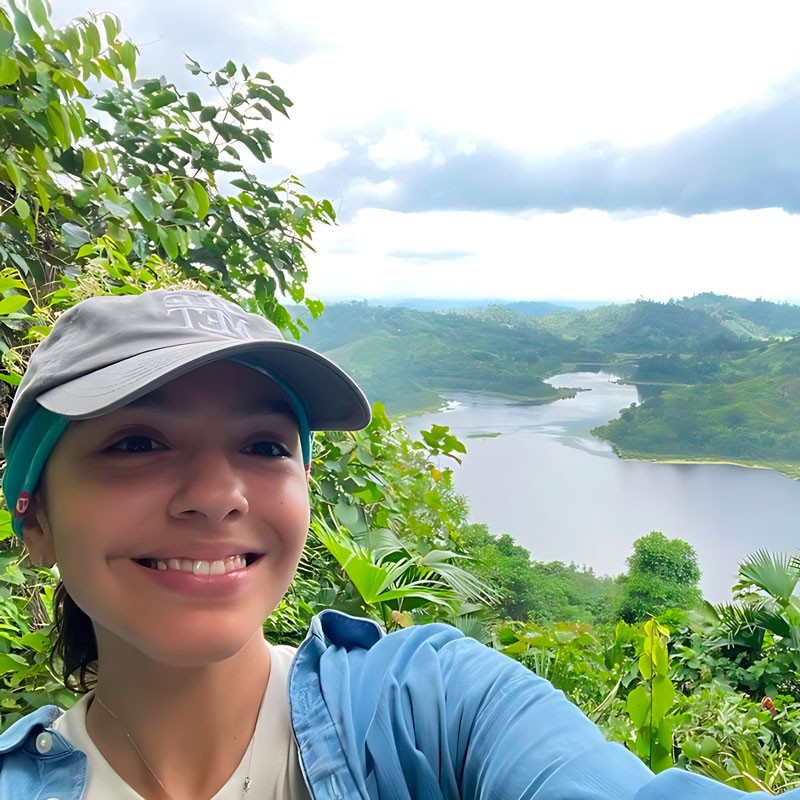
Evanna Jaramillo: assessed the distribution and ecology of sand flies (Lutzomyia), also known as manta blanca, along a degradation gradient (primary forests, secondary forests, and peri-urban areas) in the Chocó forests, within the reserve of the Foundation for the Conservation of the Tropical Andes (FCAT), Esmeraldas province. She also analyzed the status of this insect as a vector of leishmaniasis and other diseases in Ecuador, in order to determine its implications for public health. Evanna conducted this research under the supervision of Drs. Patricio Rojas and Renato León from USFQ.
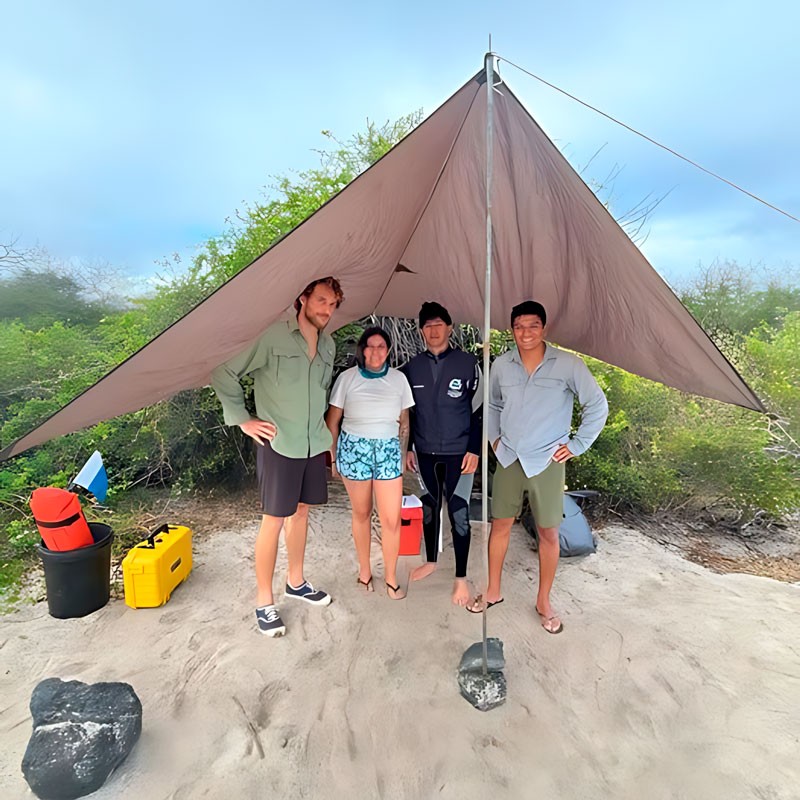
Sofía León: studied the reproduction of the Galápagos hornshark (Heterodontus quoyi) on Floreana Island. Using ultrasound technology, Sofía linked the reproductive stages of females with their hormone levels. Her study will facilitate future research for monitoring the reproductive condition of females using only a small blood sample. This study was directed and supervised by Dr. Max Hirschfeld of James Cook University (left), with the help of an excellent team of volunteers (right), as well as Elisa Bonaccorso (USFQ).
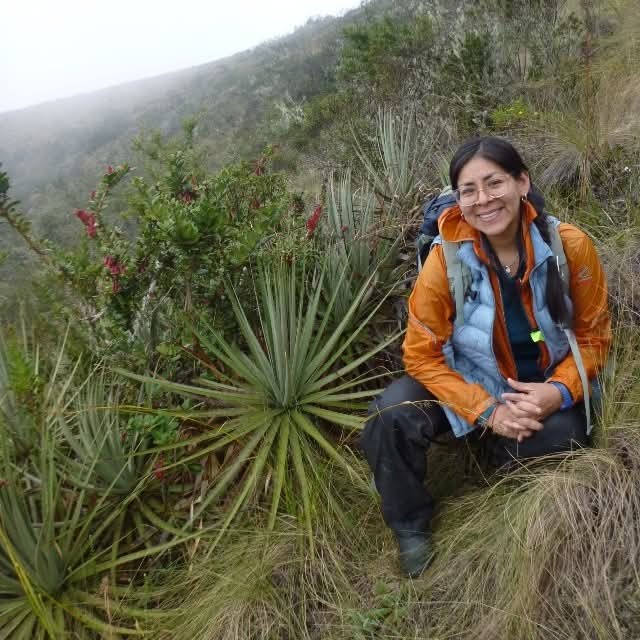
Denisse Mateo: analyzed body patterns of the Andean bear in Peru and Ecuador using an innovative non-invasive measurement method. This technique, with potential for application throughout the species’ range, seeks to contribute to conservation plans for the bear. The study was supported by Dr. Rebecca Zug from the Carnivore Laboratory at USFQ, and Dr. Russel Van Horn from the San Diego Zoo, with funding from the San Diego Zoo Wildlife Alliance.
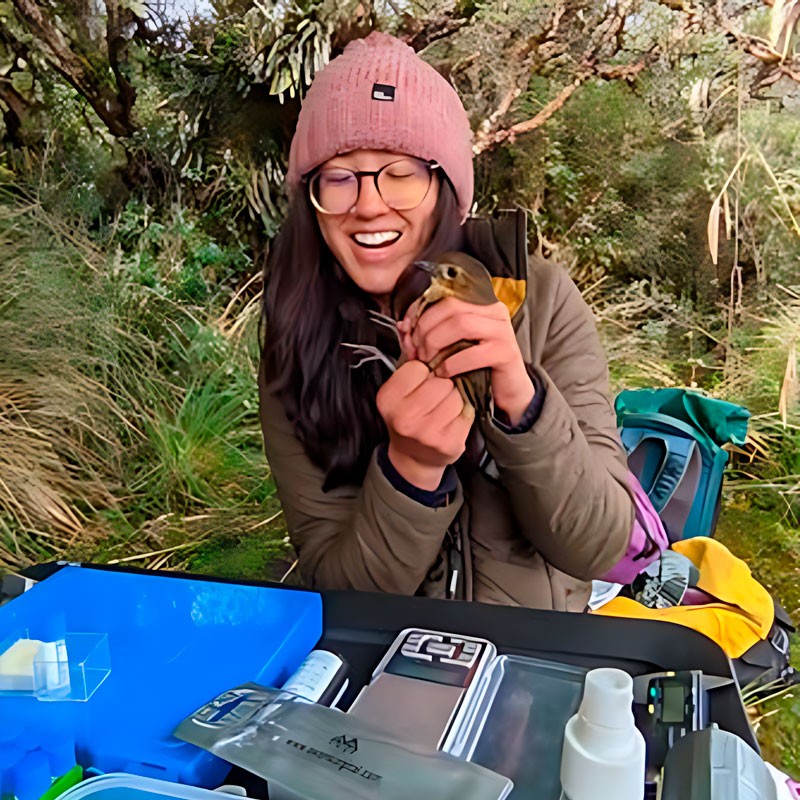
Gabriela Mena: studied avian malaria in fragmented high-Andean Polylepis forests in Ecuador to characterize ecological interactions between parasites and hosts. In doing so, Gabriela aimed to contribute to the understanding of disease ecology in high mountain ecosystems and support initiatives for their protection and conservation. This research was supervised by Elisa Bonaccorso (USFQ) and Peter Hosner (University of Copenhagen), and funded by the University of Copenhagen and USFQ.
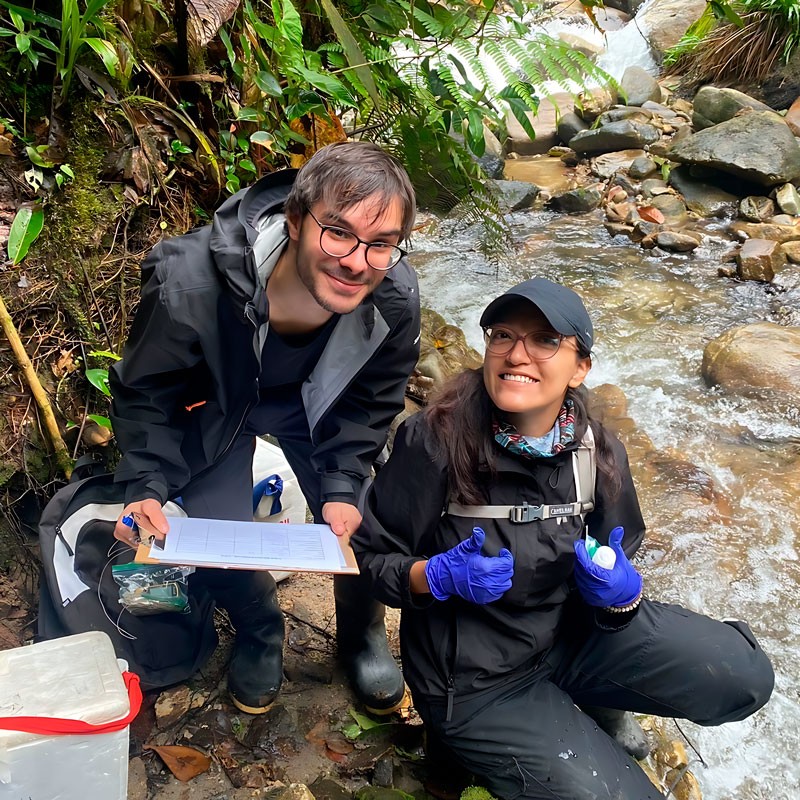
Amaru Rubio: developed his thesis in the Intag Valley (Imbabura), where he evaluated the potential impact of pollutants generated during the mining exploration phase on rivers and amphibian communities. These organisms, being highly sensitive ecological indicators, allowed for an initial understanding of mining effects and the establishment of reference points for future research and conservation measures. The research was carried out under the supervision of Juan Manuel Guayasamin and Valeria Ochoa (USFQ).

Mateo Vega: seeked to understand the effects of climate change on glass frogs. To achieve this, he used potential distribution models and analyzes patterns of phylogenetic diversity. The results helped identify species lineages and key areas for the conservation of these organisms, as well as guide actions to preserve evolutionary diversity, focusing attention on species at the highest risk of extinction. Mateo conducted this research under the supervision of Juan Manuel Guayasamin (USFQ) and Julián Velasco from the Universidad Nacional Autónoma de México.
Cohort 2021-2023
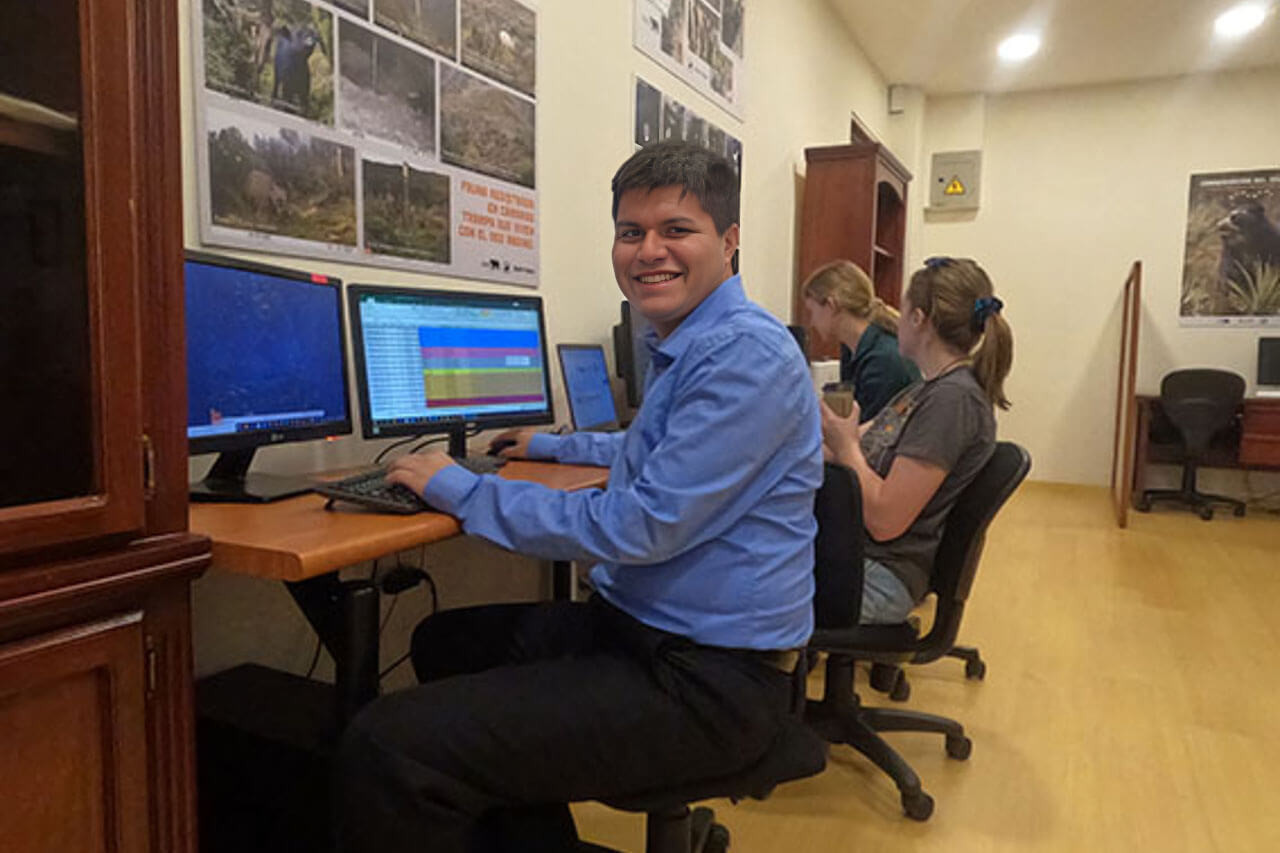
Sebastián Arostegui: used data collected from camera traps in the Condor Mountain Range in southern Ecuador to analyze interactions among felines in this landscape and how these might differ between study areas and human-influenced zones. This project was supervised by Dr. Becky Zug and emerged from a collaboration between USFQ and the Fundación Zoológica de Ecuador.
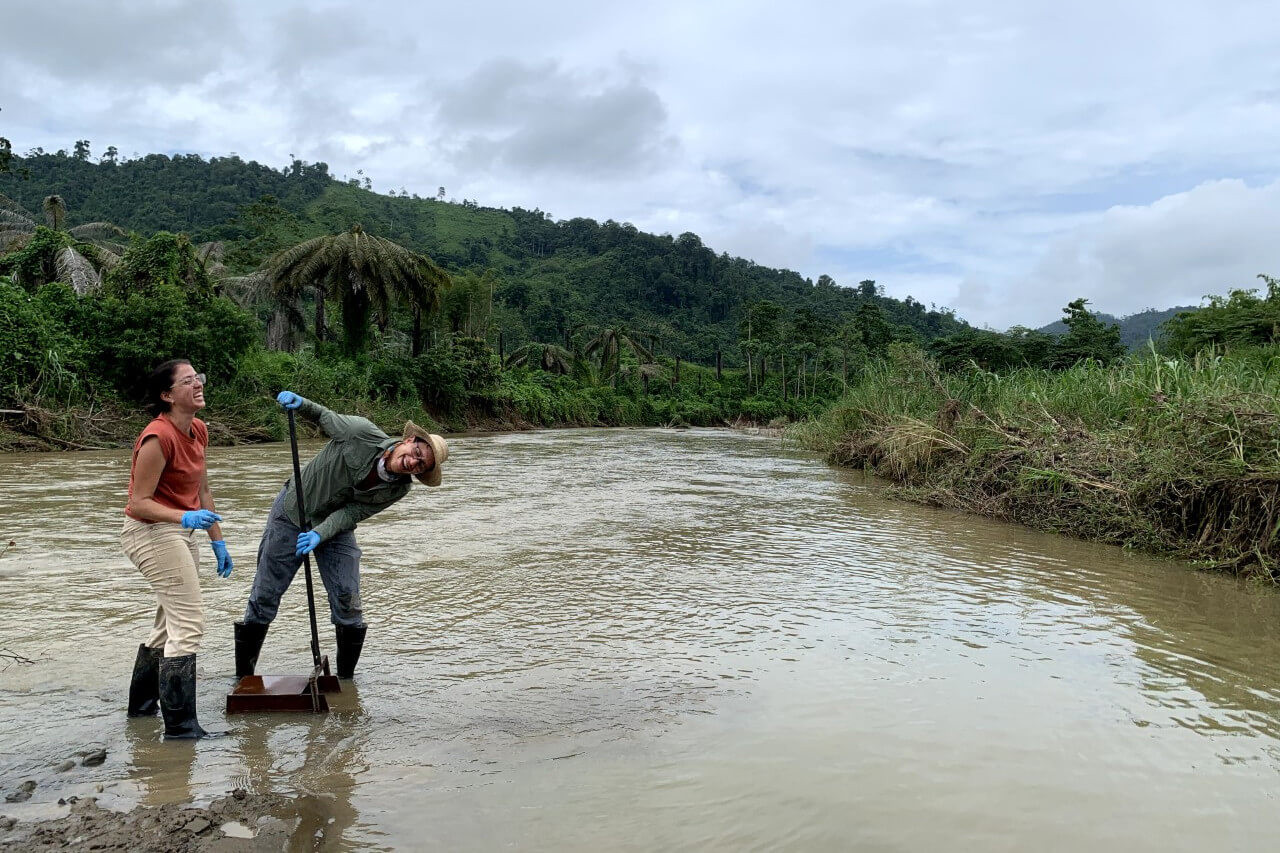
Carla Villamarín: characterized microbial communities in river sediments of the Cube Basin, an intermittent system in the Ecuadorian portion of the Chocó bioregion. Through environmental DNA metabarcoding, she identified the microbial groups present in the study area and the differences in community composition between dry and wet seasons. Her project was supervised by Dr. Andrea Encalada and was part of the DRYvER Project, which studied intermittent river systems in Europe and South America to propose adaptive management strategies.
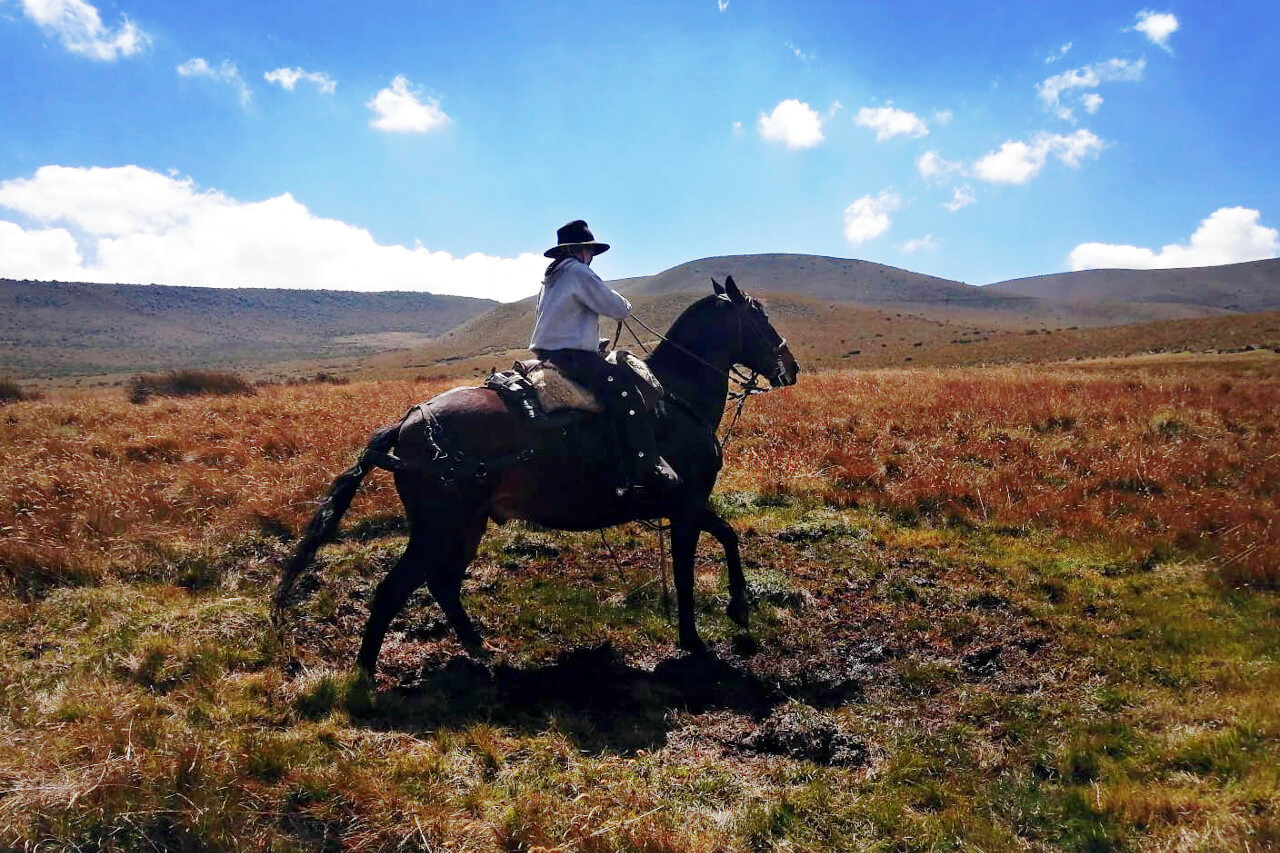
Jordan Andrés Cruz investigated the impact of trampling by large domestic mammals on carbon dioxide and methane emissions in Ecuador's high-Andean peatlands. These ecosystems are poorly understood in the Andean region despite being the terrestrial ecosystems with the highest carbon storage in their soils. Understanding their biogeochemical flows and conservation offers a significant opportunity to mitigate greenhouse gas emissions on a global scale. His work was conducted under the supervision of Dr. Esteban Suárez as part of the High Mountain Ecology Research Group (GEAM) within the Sustainable Wetlands Adaptation and Mitigation Program (SWAMP). This research was funded by the U.S. Forest Service (USFS) and conducted in the buffer zone of Antisana National Park, within the Chakana Reserve (Hacienda Antisanilla), owned by the Jocotoco Foundation.
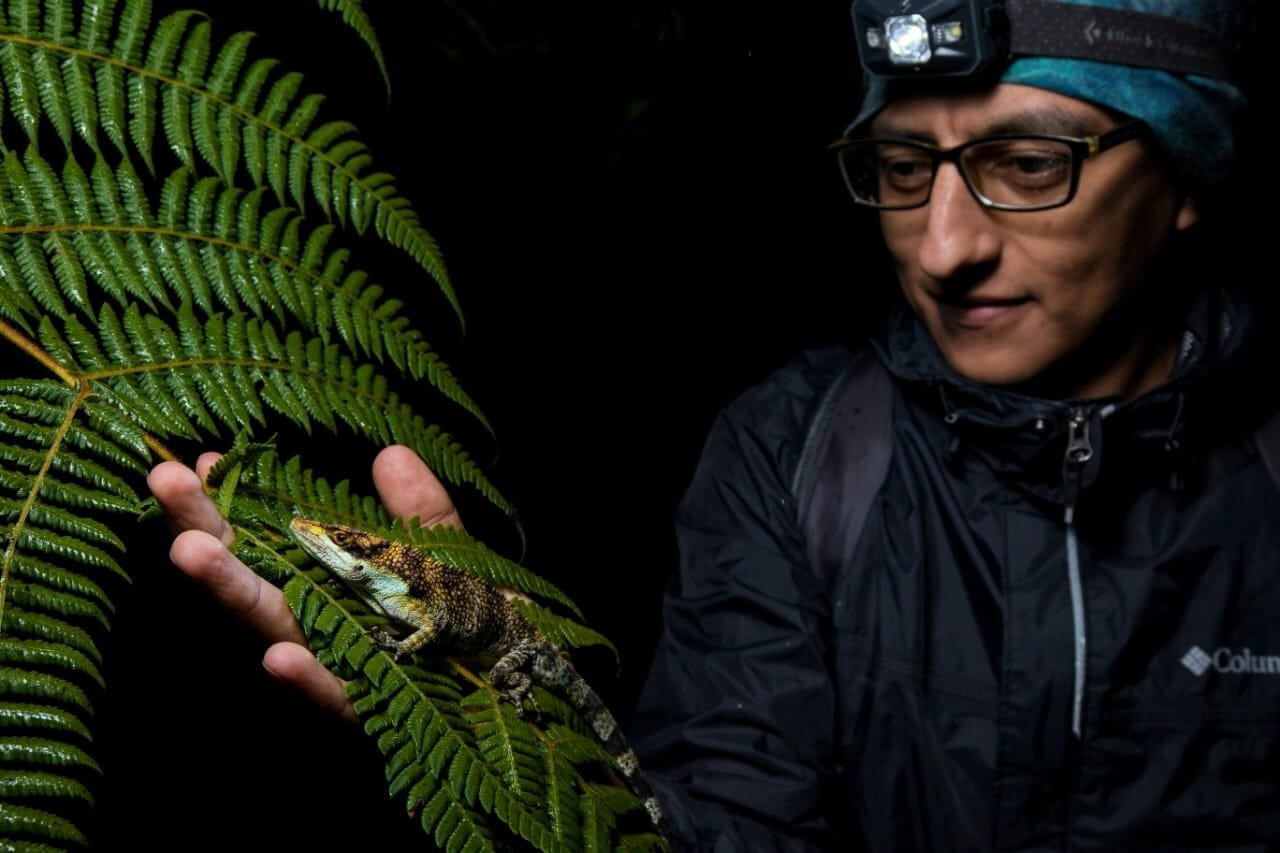
David Brito: studied patterns of body measurements and size in lizards of the genus Stenocercus, known as "Guagsas," considering their altitudinal distribution and ecology. This research was supervised by Carolina Reyes-Puig and Diego Cisneros-Heredia from the Museo de Zoología and the Instituto IBIOTROP at USFQ, with collaboration from other national universities and research institutions.
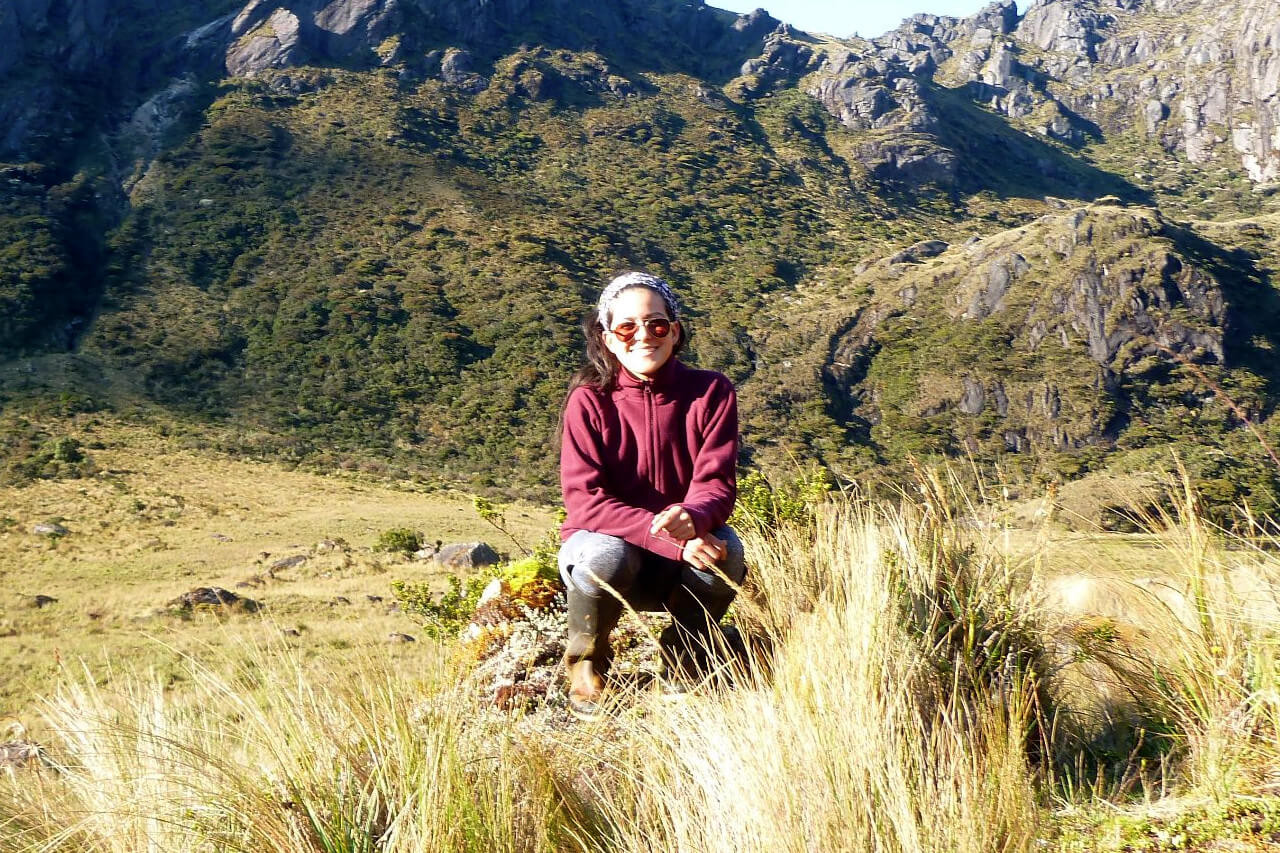
Jacquelin Montoya: studied carbon dynamics in different types of peatlands by analyzing primary productivity and carbon accumulation rates. This research was developed under the supervision of Dr. Esteban Suárez within the framework of the Sustainable Wetlands Adaptation and Mitigation Program (SWAMP) of the Center for International Forestry Research (CIFOR) and the U.S. Forest Service (USFS).
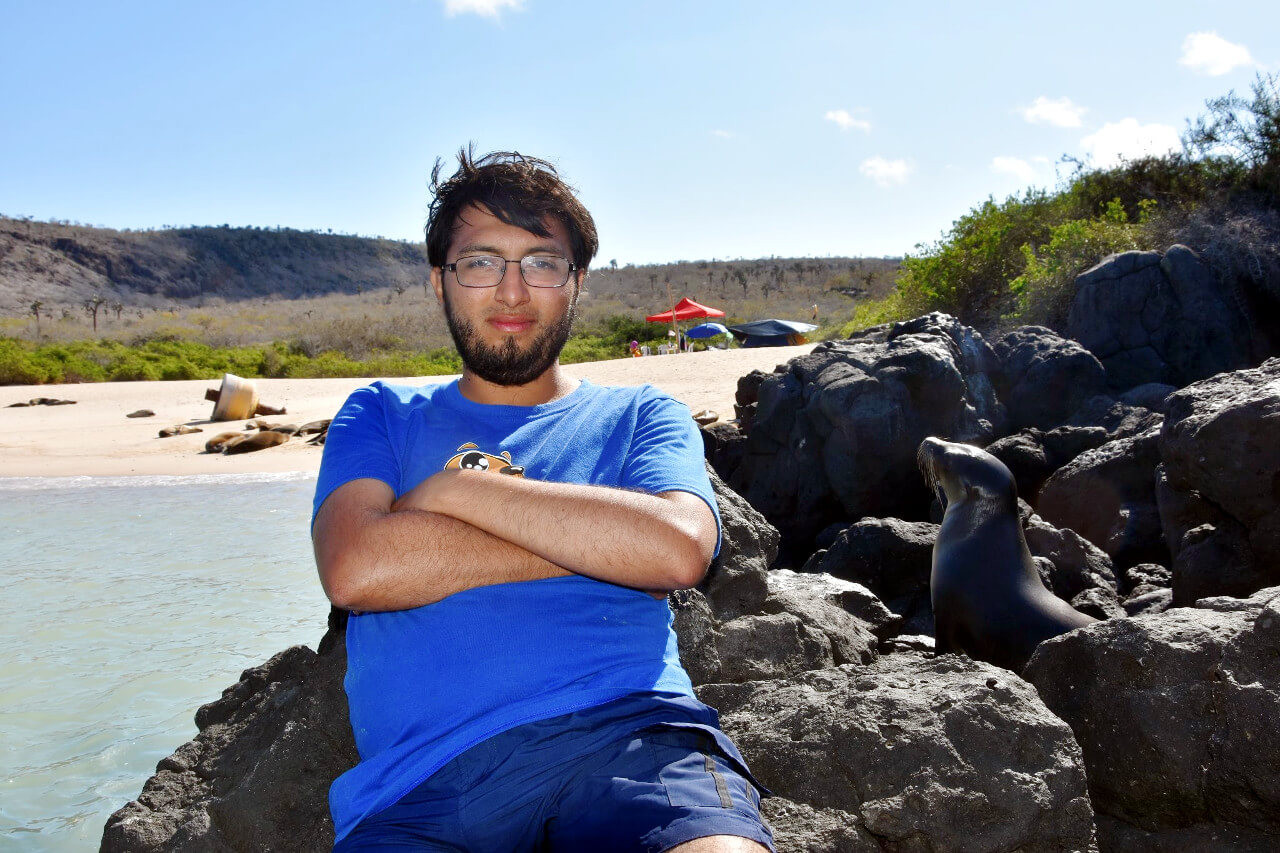
Diego Urquía: used DNA metabarcoding to analyze the diet of Galapagos sea lions across five different colonies in the southeastern Archipelago. This method allowed him to discover new prey for these animals, never before described in science. This project was led by Dr. Diego Páez-Rosas in collaboration with the Technical University of Brunswick, Germany. The resulting article was published in the scientific journal Ecology and Evolution and is available at: https://onlinelibrary.wiley.com/doi/pdf/10.1002/ece3.10921.
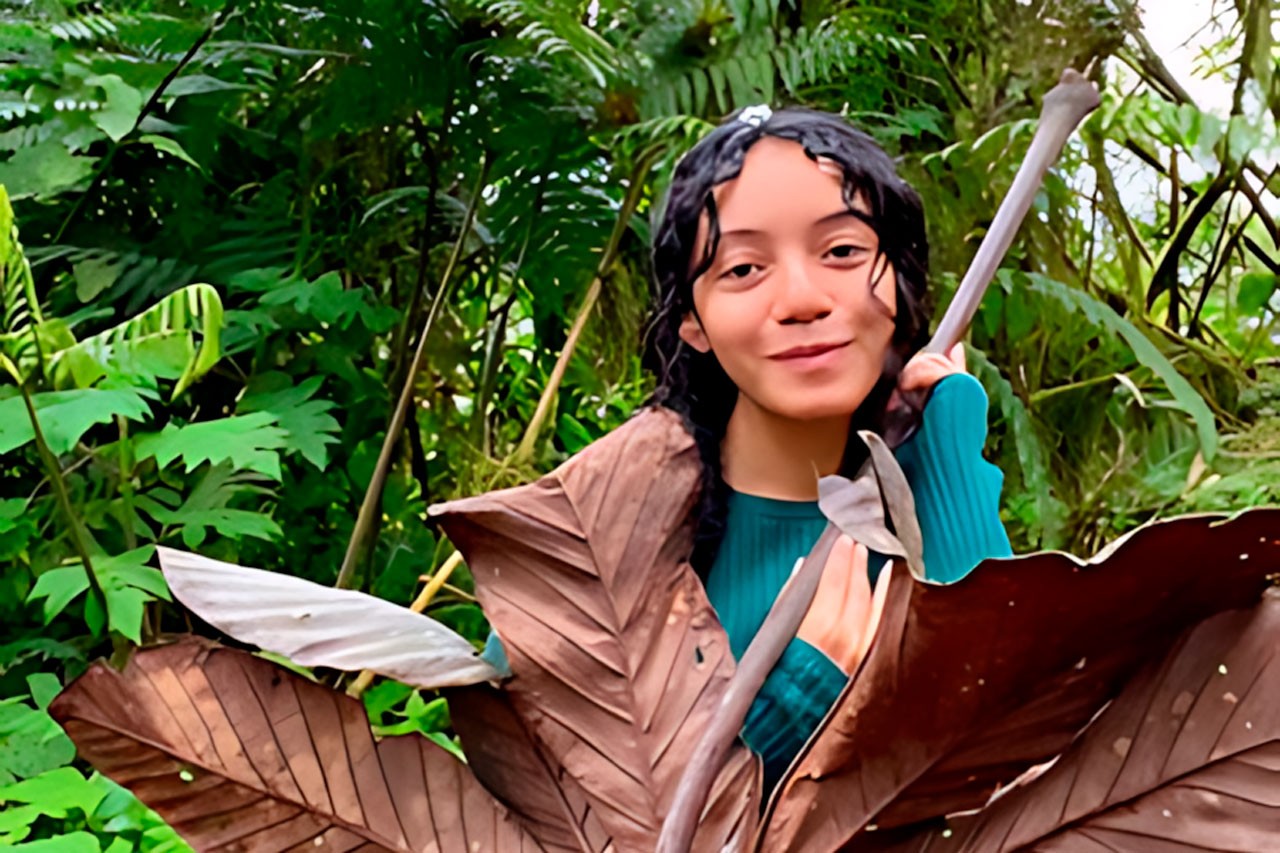
Alisson Fierro-Minda investigated environmental determinants influencing group size and the presence of solitary individuals in mantled howler monkeys (Alouatta palliata aequatorialis) in Ecuador. She used generalized linear models to identify environmental and anthropogenic variables that significantly affect this threatened species. This research was conducted under the supervision of Dr. Stella De La Torre (USFQ).
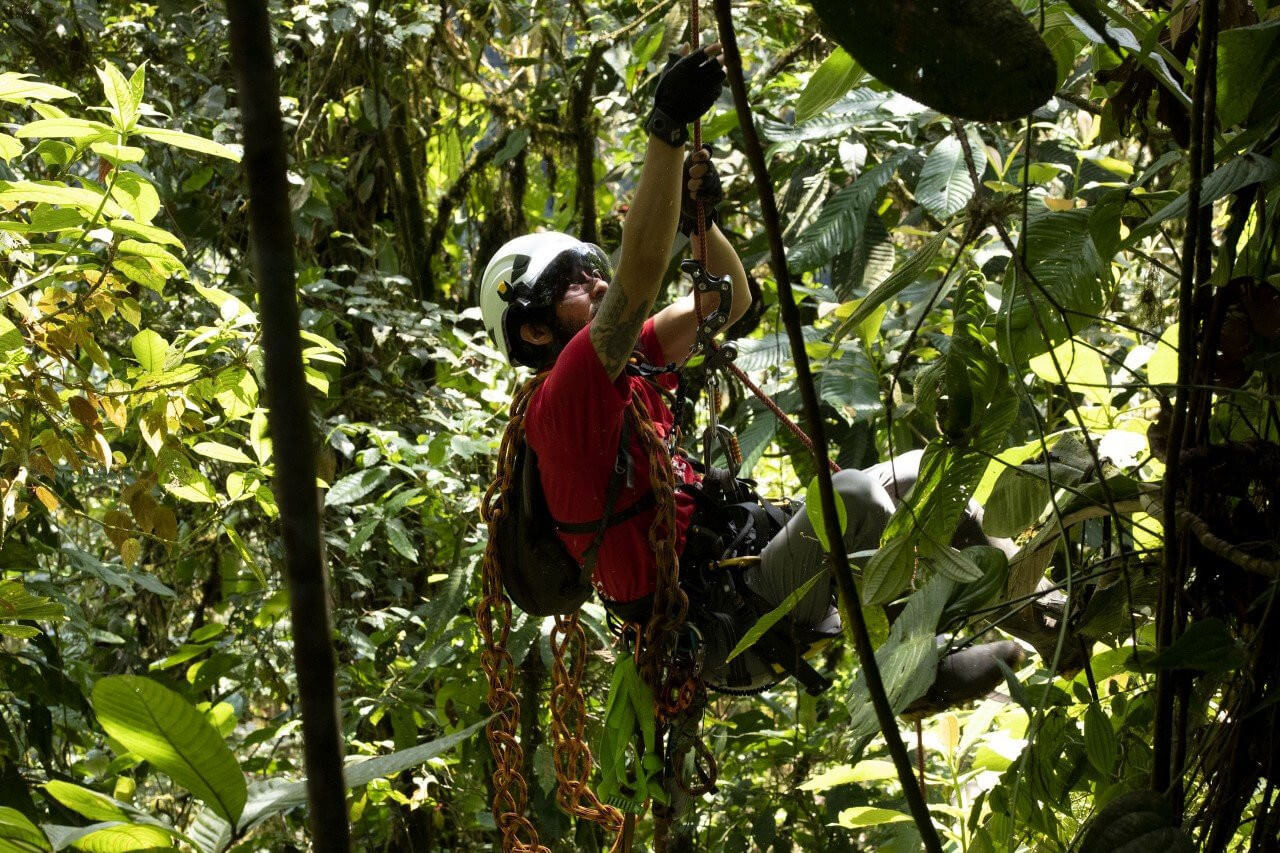
Francisco Velásquez-Espín studied one of the least understood forest strata: the canopy. In this level of the cloud forest, Francisco investigated the diversity of amphibians, reptiles, and invertebrates. His work was conducted in collaboration with researchers from Texas State University (Rodríguez Lab) and Texas A&M University-Corpus Christi (McCracken Lab), with support from Fundación Futuro, Third Millennium Alliance, and Mashpi Lodge. He was supervised by Dr. Juan Manuel Guayasamín (USFQ) and Dr. Shawn McCracken (TAMU-CC). To access his sampling sites, located up to 30 meters high, Francisco employed arborist and climbing techniques.
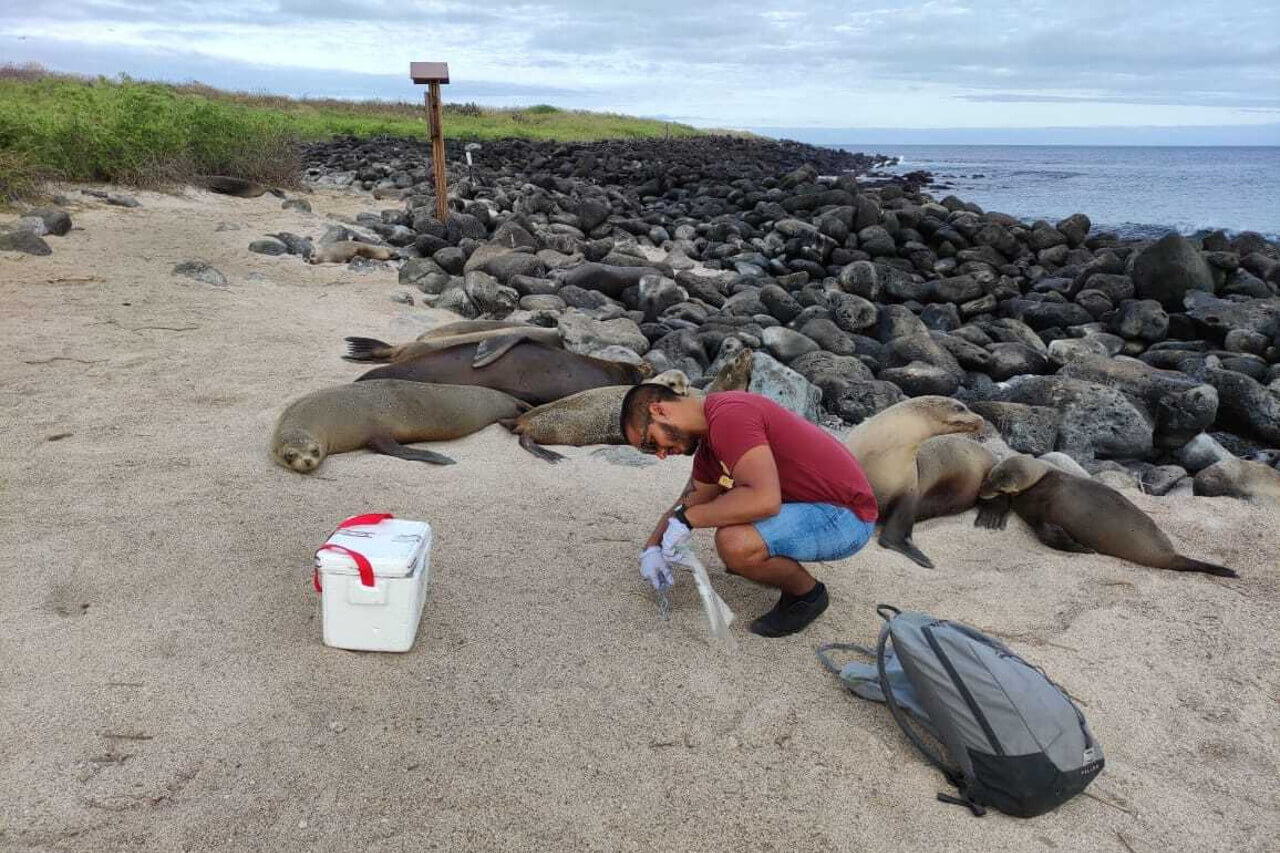
Andrés Moreira investigated the incidence of microplastics in the trophic network of apex predators in the Galapagos Marine Reserve. Microplastics are present in all oceans and pose a significant threat to biodiversity. He analyzed excrement from different colonies of the Galapagos sea lion (Zalophus wollebaeki) in the southeastern Archipelago to identify these particles using chemical digestion of organic matter and Fourier-transform infrared spectroscopy. This project was conducted through an inter-institutional collaboration between Universidad San Francisco de Quito (USFQ), the Galapagos Science Center (GSC), and the University of Barcelona (UB), under the supervision of Dr. Diego Páez-Rosas (USFQ-GSC) and Dr. Odei García-Garín (UB). The resulting article was published in the scientific journal Science of the Total Environment: https://www.sciencedirect.com/science/article/abs/pii/S0048969723048489.
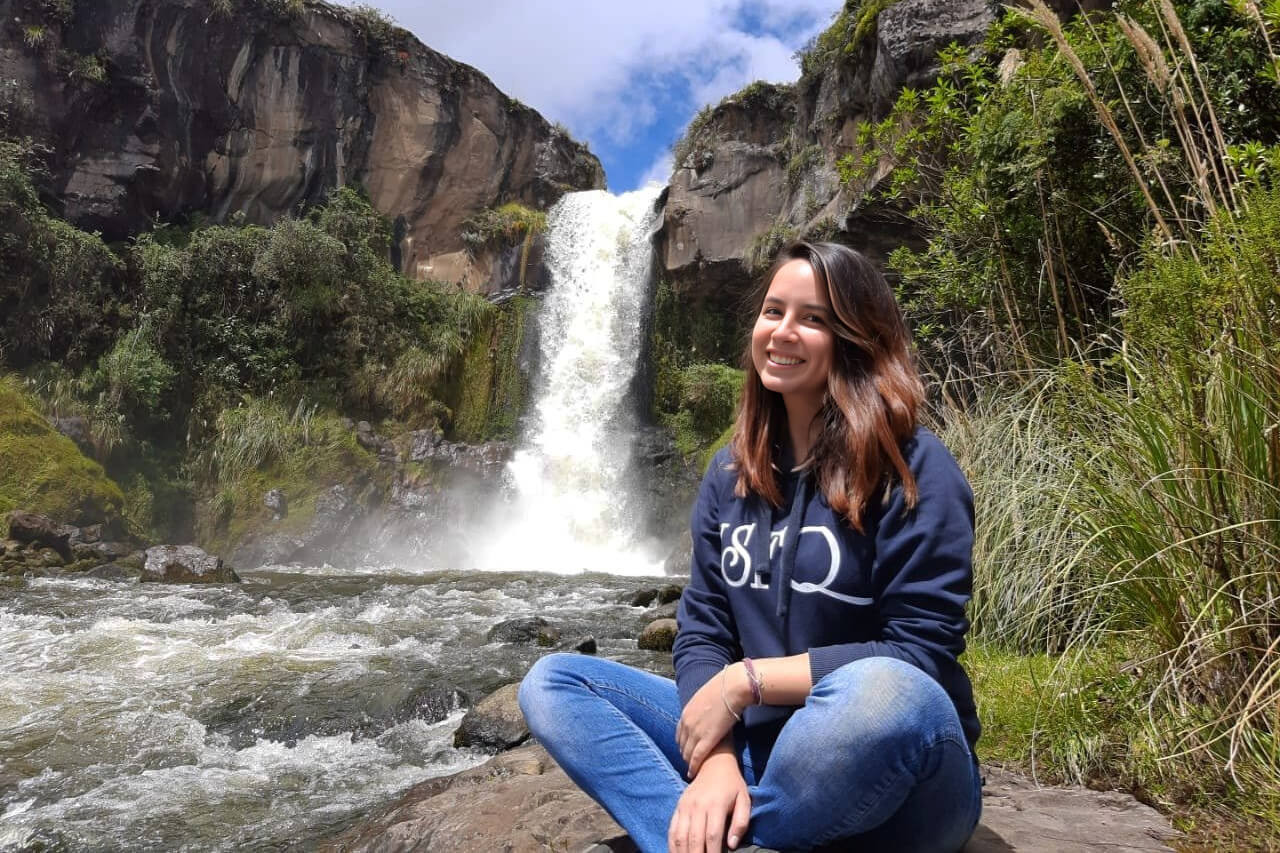
Emilia Peñaherrera developed her thesis through a comprehensive assessment of Important Bird and Biodiversity Areas (IBAs) in the Tropical Andes. She used data on biodiversity, conservation, and governance. IBAs, which focus on conserving bird species and their habitats, have become one of the strongest global strategies for prioritizing conservation. This project was developed thanks to a collaboration between BirdLife International and Universidad San Francisco de Quito through its institutes ECOLAP-USFQ and IBIOTROP-USFQ, under the guidance of Drs. Susana Cárdenas and Diego F. Cisneros-Heredia (USFQ).
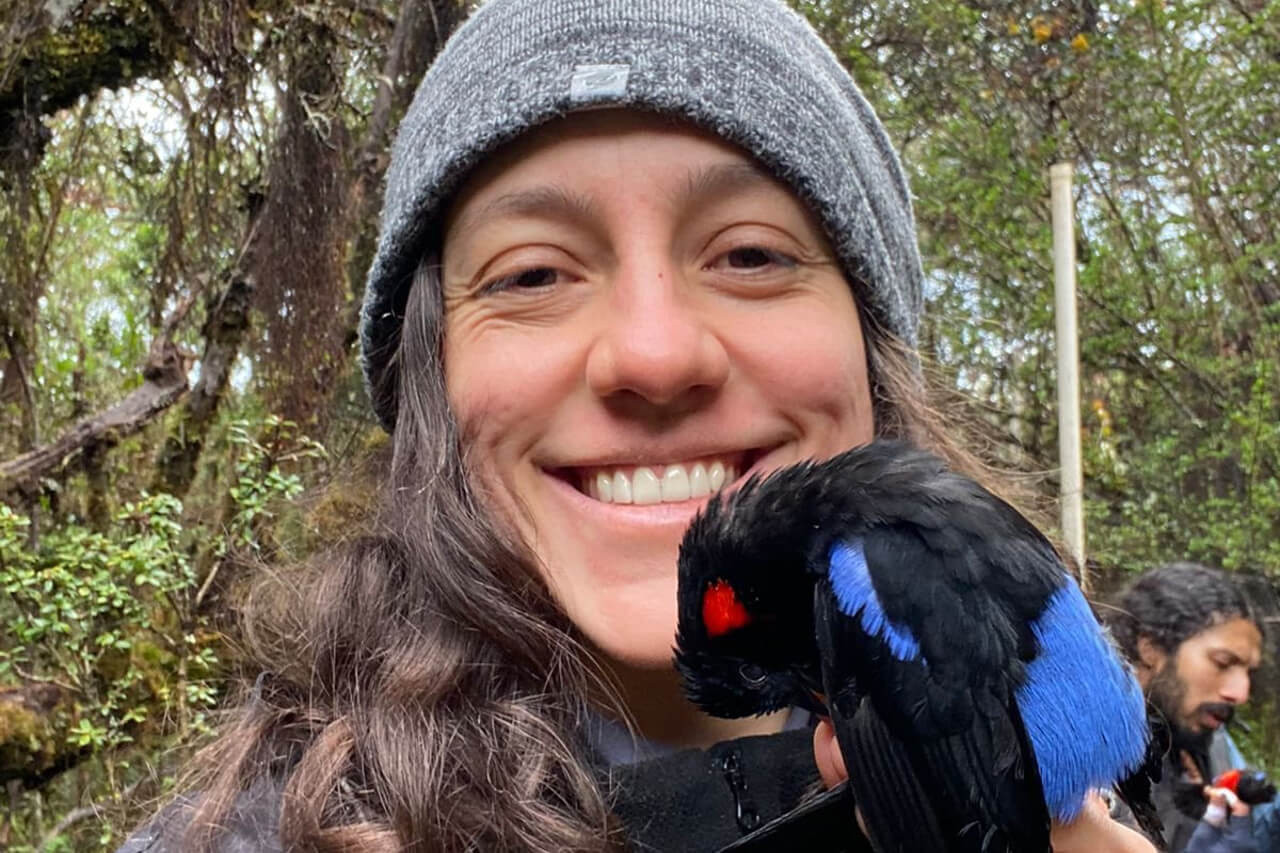
María José Arias studied the distribution of passerine birds along an elevational gradient in northwestern Ecuadorian Andes. She collaborated with Abhimanyu Lele and Jacob Drucker, doctoral candidates from the University of Chicago and researchers at the Field Museum, under the mentorship of Dr. Elisa Bonaccorso (USFQ) and Abhimanyu Lele. Field methods included mist netting and point counts at various locations along the gradient, covering an approximate elevation range of 500 to 4000 meters.
Aplicant's profile
This program is designed for professionals with degrees in Biology, Genetics, Biodiversity and Genetic Resources, Ecology, and related disciplines. In case of degrees obtained outside of Ecuador, the title will have to be apostilled or certified via the country’s consular office in Ecuador. The USFQ will verify the validity of the degree, following the Ecuadorian legislation. Once accepted, the applicant will have to register the degree at SENESCYT (the National Secretariat for Superior Education, Science, and Technology) before the program's start date.
Workfield
Our graduates will be prepared to do independent research and work as part of inter and multidisciplinary groups in educational, research or conservation institutions, governmental or non-governmental organizations dedicated to areas related to ecology and conservation, or continue their path towards an academic career.
Advantages
The Master’s in Tropical Ecology and Conservation at USFQ conjugates a great diversity of advantages that allow our graduate students to:
- Obtain a solid theoretical and practical education based on research, offered and supervised by the best faculty in Tropical Ecology and Conservation in Ecuador.
- Have access to excellent research laboratories in Marine Ecology (Galapagos Islands), Aquatic Ecology, Evolutionary Biology, Biotecnology, and Environmental Engineering, among others.
- Take advantage of research opportunities in our biological stations in the Galapagos Islands, Tiputini (Yasuní National Park), Tandayapa (Andean Choco Biosphere Reserve), and the network of nature reserves managed by our strategic partners.
- Be part of the team of the research institutes and centers of the USFQ: Instituto Biósfera, iBIOTROP, Instituto de Geografía, Instituto de Ecología Aplicada, Instituto de Microbiología, and Galapagos Science Center.
- Learn in a program taught in English, with international invited professors, and a modern perspective towards basic and applied research, which will offer opportunities to connect with researchers and research labs in Ecuador and countries around the world.
Admission Process
Basic requirements (requested by the USFQ Graduate School)
- To have an undergraduate degree in Biology, Genetics, Biodiversity and Genetic Resources, Ecology, and related disciplines. The diploma must have Apostille or be certified via the consular office of the issuing country in Ecuador. Once accepted, the applicant will have to register the degree at SENESCYT (the National Secretariat for Superior Education, Science, and Technology) before the program's start date.
- Proof of English proficiency, equivalent to B1 level of the Common European Framework. Proficiency may be proved by taking the USFQ English exam or providing certification for taking the TOEFL, IELTS, or Cambridge exams within the last 2 years.
- Copy of identification document (passport or Ecuadorian cédula).
- Official transcripts.
- Degree registered at SENESCYT (once accepted).
- To approve the USFQ Graduate School exam. To take this exam (in Spanish), please go to /en/admissions/postgraduate
Specific Requirements of the Master’s Program
- To approve the Program-specific Knowledge Test (questions will have a "short essay" approach). The exam will be offered online using the USFQ D2L system. Applicants must demonstrate their capability in the integration of knowledge and analysis of case studies on basic tenants of Ecology, Evolutionary Biology, Genetics, and Experimental Design. The exam will be developed in English to evaluate the student 's writing skills and synthesis ability in this language. For the exam, check the list of subjects here: https://www.dropbox.com/s/9khsdkzij0j7d4k/Subject%20list-Exam-METC.pdf?dl=0
If you need access to books to prepare for the exam, please contact Irina Muñoz at imunozr@usfq.edu.ec
- Complete Application Form for the Master's Program. In this form, the applicants will select their preferred date to take the Program-specific Knowledge Test. Also, they will have to select the scholarship to which they would like to apply (maximum two). Finally, they will have to attach the following documents in PDF format:
- Curriculum Vitae.
- Letter of intent, in English, explaining the student’s interest in becoming part of the Master's Program.
- Two academic/professional references, including full names, email, and institutional affiliation. The program Director will request the referees to fill out the Reference Form (in English or Spanish) to complete the application process.
- If this were the case, upload additional requirements for each scholarship (see FUNDING section).
- Once the Application Form is validated, the aspirant will be contacted for an interview face-to-face at USFQ Cumbayá campus or online if the aspirant is not in Quito, with the Admissions Committee.
Application Form: https://form.jotformz.com/210195077019655
Scholarships
Scholarships are available only for Ecuadorian citizens and residents. Applicants must indicate the scholarship of interest (maximum two) in the Application Form (see the Requirements to Apply section) and, if applicable, upload the additional requirements requested for each scholarship.
Scholarships are not additive, and the decision on their allocation will be made by the Admissions Committee once the applicants have been accepted into the program.
The number of scholarhips and the amounts they cover change from cohort to cohort, depending on available funds from USFQ and specific research projects developed by our professors. Available Scholarships:
4 scholarships of 50% of the tuition of the Master's Program.
- Two scholarships from the USFQ Dean of Research to applicants who demonstrate excellent academic training (assessed through their application) and research experience (demonstrated through publications).
- Two scholarships from the Master's Program to applicants who demonstrate excellent academic training (assessed through their application) and research experience (demonstrated through publications). To maintain this scholarship, the student must obtain a Grade Point Average (GPA) equal to or greater than 3.5/4.00 during their training process.
Funding
- The total cost of the program can be paid in four installments that correspond to the number of ordinary academic periods of the program. Each installment can be paid in cash, check, student loan or credit card.
Credit or debit card: you can make your payment through our Online Payment System, accessing the link: https://btnpagos.usfq.edu.ec/pagos/
- We accept all national and international credit cards.
- You can defer your payments with cards issued by: Diners, Discover, Visa Titanium, Banco Guayaquil, Banco Pichincha, Banco Bolivariano, Produbanco, and Banco del Austro.
- Payments for years: up to 12 months without interest.
- Payments for the entire race: the same duration of the race without interest.
- Deferred payments of up to 36 months with interest are enabled for all options if a longer term is required.
Transfer, deposit: you can make your deposit or transfer with the following information and load the receipt in the Online Payment System at the link:
Owner:
Universidad San Francisco de Quito - USFQ RUC: 1791836154001
Banco Pichincha: Cuenta corriente No. 3407330004
Banco Bolivariano: Cuenta corriente No. 5075003350
For more information, you can write to:
Methods of payment: Oscar Castañeda, ocastaneda@usfq.edu.ec, (+593) 2 297-1700 ext. 1816
Direct financing plan: plandefinanciamiento@usfq.edu.ec
International students
International Students in the METC
The master's program is open to students from all over the world. We have a support team that facilitates the application process for international students, including assistance in obtaining an apostilled diploma and a recognized degree by Ecuador's Secretariat of Higher Education, Science, Technology, and Innovation (SENESCYT). We also provide support for students during the process of obtaining a student visa.
If you are an international student, please contact the program director, Elisa Bonaccorso (ebonaccorso@usfq.edu.ec), so she can guide you throughout the entire application process.

